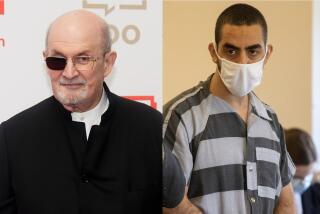Sir Salman’s plight
- Share via
SALMAN RUSHDIE, with a little help from her majesty, has again clarified the battle lines on which we stand.
Britain is honoring him for what he has written, and as a result, he is again being threatened with death.
An Iranian organization has offered a reward of about $160,000 for his murder. Pakistan’s religious affairs minister, Mohammad Ejaz ul-Haq, son of the former military dictator, Zia ul-Haq, told his country’s National Assembly that a suicide bombing could be justified as a response. The speaker of the Punjab provincial assembly says he would kill Rushdie if they came face to face.
Almost as grotesque was the reaction of a British Muslim peer, Lord Ahmed of Rotherham, who expressed his outrage at “honoring the man who has blood on his hands.” White-is-black thinking of an almost Orwellian kind, this turns the victim into the murderer.
The issue here is not whether Rushdie’s writing merits a knighthood or whether left-wing, cosmopolitan writers should accept honors from her majesty. (My answers are “yes,” and “why not?” but that’s by the way.)
The issue is whether people should be killed, or need to be protected from a serious threat of being killed, for what they say or write. And whether a sovereign, democratic state should censor its recognition of its own citizens in the face of such intimidation.
On this, there can be no compromise, no ifs or buts. All our individual solidarity, all the necessary resources of the state, are called for at such a moment. Although this does not seem to have been uppermost in the minds of the committee that recommended the award, when the queen taps Mr. Rushdie on the shoulder with her ceremonial sword and says, “Arise, Sir Salman,” she will now be striking a regal blow for free speech.
The right to free speech is not unlimited. In determining its limits, context matters.
American Justice Oliver Wendell Holmes famously observed that a man should not be free to shout a false alarm of “Fire!” in a crowded theater. Now, the fact is that even if a secular liberal intellectual were to say, “Mad Mullah X deserves to be shot,” the likelihood that someone would go out and shoot Mullah X as a result is close to zero. There are no al-Darwinia brigades practicing bomb making in secret laboratories, awaiting an order from their beloved imam Richard Dawkins to assassinate Mullah X.
If, however, a Muslim cleric or intellectual says, “Salman Rushdie deserves to be shot,” there are people out there who may take it literally. Remember that Rushdie’s Japanese translator was murdered, his Italian translator was stabbed and his Norwegian publisher attacked because Ayatollah Ruhollah Khomeini had called for everyone involved in propagating “The Satanic Verses” to be punished. Because of this explosive context, Muslim speakers need to exercise a particular care in their choice of words.
We non-Muslims need, in return, to be generously clear about the distinction between what a free society requires of them and what we merely desire. We may desire that they abandon what we regard as outmoded superstitions, that they “see reason,” become modern, liberal and secular. But, in a free society, nobody should require that of them.
The toleration of widely differing opinions and beliefs is precisely what distinguishes a free society from the ideological regimes of the Middle East. Rushdie wrote a fiction that was deeply offensive to many Muslims. Muslims have the right to be deeply offensive back. Indeed, they have the perfect right to articulate positions that we may regard as irrational, retrograde and oppressive. All that a free society requires of them — as of every other citizen — is that they conduct this argument peacefully and obey the law of the land.
I note with appreciation and respect that a growing number of British Muslims, including some who burned Rushdie’s books back in 1989, are now themselves standing firmly on this line. I will be the first to defend their right to articulate their beliefs in ways that may be just as offensive to an atheist as Rushdie’s novel was to them. In a free society, we don’t have to agree. We only have to agree on how we disagree.


